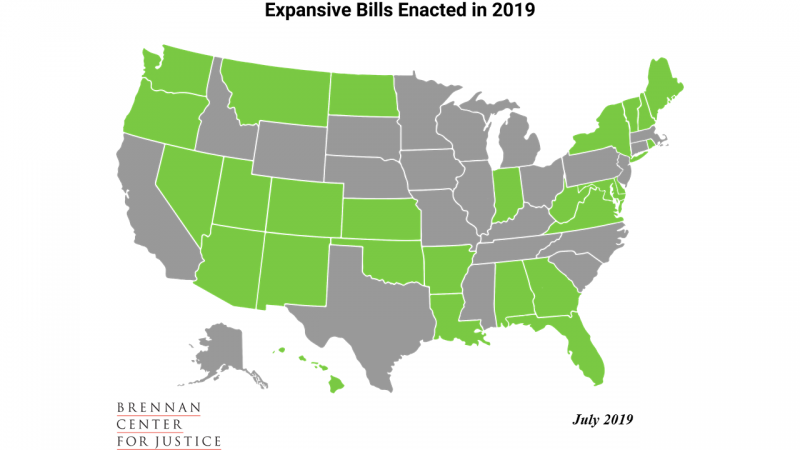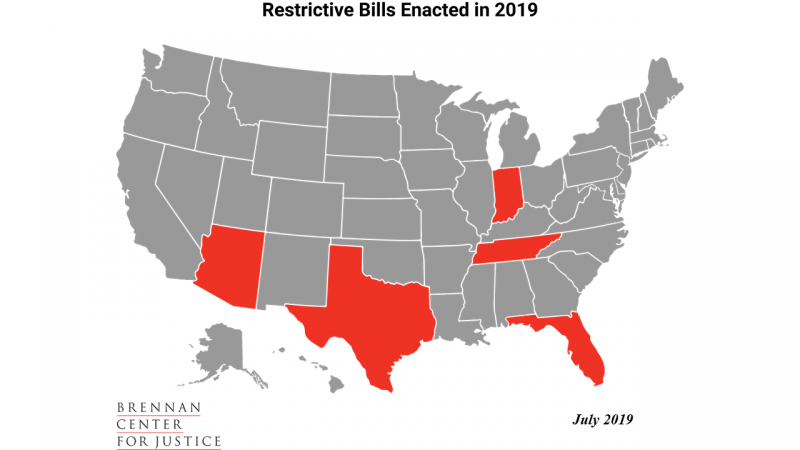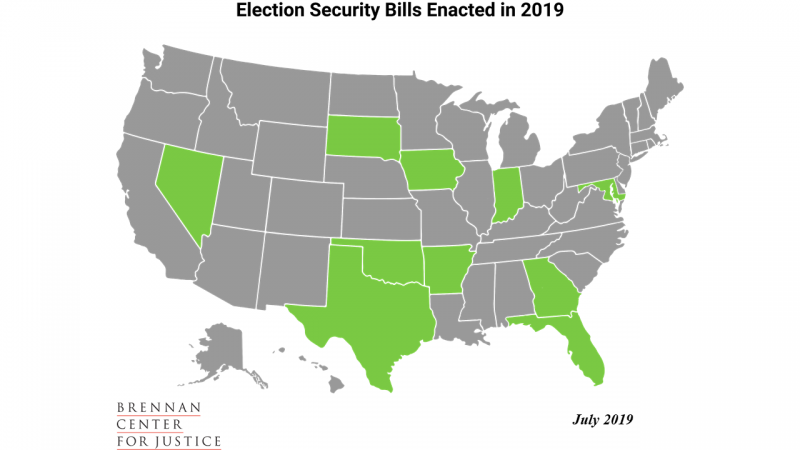At this point in the year, 42 state legislatures have concluded their last regular legislative session in the leadup to a presidential election year. Looking back at this session, three new, Democratic trifectas – New York, Nevada, and Colorado – were responsible for an outsize portion of the most impactful expansive voting laws enacted so far this year. footnote1_XIoewqhRy42D-c8ubMG1EfABHKmUMIWGBkyNNn2z0jI_tWy781mggBgK1 This document tracks certain voting legislation making it easier or harder to register or vote, as well as certain legislation related to election security. Evaluating which laws to include requires exercising judgment and is not susceptible to precise quantification. Note that there are several types of election- and voting-related legislation that we do not track, including: redistricting, ballot design, enfranchisement of people under 18 or non-citizens, or public or individual notice requirements. The document also does not track administrative changes that could expand or restrict access.
At the same time, a late-session surge in legislation cutting back voting access was successful in creating new restrictions in five states. Most significantly, in Florida, a new restriction cuts back on the gains made by Amendment 4. This new restriction could dramatically curtail the number of people who get their voting rights back under Amendment 4 and it flies in the face of the voters’ decision last November to expand voting access. In addition, in Tennessee, lawmakers added new burdens on voter registration drives. And in Texas, lawmakers pushed through a new restriction on early voting, but it could have been even worse, if a powerful coalition had not come together to stop an even more restrictive bill that was moving toward passage.
Overall, since the start of the session, 46 states have introduced or carried over 688 bills expanding access compared to 29 states have introduced or carried over at least 87 bills restricting voting access. In addition, 33 states have introduced or carried over at least 108 bills related to election security.
Expansive Voting Bills
The massive burst of pro-voter bills introduced this session – 688 bills in 46 states – translated into significant reform across the country. As a group, states with new, Democratic trifectas led the way in terms of expansive laws this year – and, within that group, New York, Colorado, and Nevada enacted multiple, high-impact reforms. In addition, Delaware and Virginia enacted early in person voting. And a number of other states – under Democratic, GOP, and mixed control – enacted reforms that are either more incremental or alleviate past voter suppression.
(Click here for a list of expansive bills that have passed at least one house and are still alive – as we are now deep into the legislative calendar, bills that have seen significant movement are generally the ones to watch for passage.)

A couple of other trends emerged as well. States enacted a number of bills providing notice and cure opportunities for absentee ballots and voter registrations. In addition, despite Florida’s decision to cut back on Amendment 4, rights restoration continues to gain momentum. See below for more details:
- New Democratic Trifectas. Following the 2018 election, Democrats newly obtained trifecta control of state government in six states. At the start of 2019, U.S. House Democrats made democracy reform a central part of the party’s agenda, by introducing (and then passing) a democracy reform bill as H.R.1 – the first bill in the new House. Each of the six states with new Democratic trifectas states has enacted (or is shortly expected to enact) major pro-voter reforms.
- New York passed the most significant reforms this year, enacting into law a package of voting reforms at the start of the legislative session, including: early voting (SB 1102), pre-registration for 16– and 17-year-olds (AB 774), and portability of registration records (AB 775), as well as a law that consolidated the dates for state and federal primaries and required ballots to be distributed to military voters farther in advance of elections (AB 779). The legislature also passed constitutional amendments to permit same-day registration (SB 1048) and no-excuse absentee voting (SB 1049), which will need to be passed again and then ratified by the voters.
- Colorado enacted a law restoring voting rights to individuals on release from incarceration (HB 19–1266) and a law expanding AVR and writing that reform into the statute books (it had previously been put in place as an administrative measure by election and DMV officials) (HB 19–235). In addition, the state enacted a law improving voting access for voters with disabilities (SB 19–202) and a law with several additional reforms, including new standards for vote centers and improvements to the registration process for voters living on Indian reservations (HB 19–1278).
- The Illinois legislature sent Governor Pritzker a bill that would enhance voting access for eligible voters confined in jails (SB 2090).
- Maine enacted AVR (HB 1463).
- Nevada enacted a law providing immediate rights restoration to people on release from incarceration (AB 431) and a law that authorizes same day registration, improves the provisional ballot process and extends early or absentee voting deadlines, among other reforms (AB 345).
- New Mexico enacted same day voter registration (SB 672).
- Additional Notable Reforms. Several states passed additional expansive reforms through their legislative process. Both red and blue states took steps to expand access this year – continuing a trend we have seen throughout the decade. While GOP-controlled states passed a wide variety of pro-voter measures, the most common were reforms to enhance absentee voting and access for voters with disabilities. Reforms include:
- Delaware enacted early in-person voting (HB 38).
- Georgia enacted into law reforms addressing a variety of problems with its voting systems (and the lawsuits that challenged them), including improvements to its “no match, no vote” policy, voter purges, absentee voting, provisional voting, voting for people with disabilities (HB 316).
- Virginia enacted no-excuse early in-person voting (SB 1026/HB 2790).
- Washington enacted a Native American voting rights act (SB 5079).
- Notice/Cure Process. States’ processes for determining the validity of voting materials like absentee ballots or registration applications are critically important but can result in improper disenfranchisement. For example, some states require elections officials to compare the voter’s signature on an absentee ballot with the signature they have on file and to reject the ballot if the signatures do not match. In some cases, though, states offer inadequate guidance to officials to make the comparison and inadequate recourse to voters whose ballots have been rejected.
This year, several states enacted laws that require election officials to notify and/or permit voters to cure deficiencies in absentee ballots, absentee ballot applications, or voter registration applications (or improve their existing processes), including: Arizona (SB 1054), Florida (SB 7066), Georgia (HB 316), Kansas (SB 130), and Virginia (HB 1042).
- Rights Restoration Momentum Continues. Last year, Florida voters enacted the paradigm-shifting Amendment 4, and New York and Louisiana also made major improvements to their rights restoration laws. This year, while Florida lawmakers cut back on Amendment 4, lawmakers in other states pushed forward.
- As noted above, Colorado and Nevada enacted rights restoration laws. In addition, Arizona enacted a law that would eliminate the obligation for people with only one felony conviction to pay certain types of legal financial obligations before having their voting rights restored (HB 2080). People are still required, however, to pay any outstanding restitution.
- California (AB 646) and New Jersey (SB 2100) continue to consider rights restoration legislation.
- Moreover, even though efforts in Iowa (HJR 14) and Tennessee came up short this year, the seriousness of those efforts, in states with extremely restrictive rights restoration regimes, is a further indication of the momentum behind this critical reform.
Restrictive Voting Bills
While some states are expanding voting access, others are cutting it back. At least seven restrictive bills in five states have been signed into law. All of the five states with new restrictions are under Republican trifecta control, and all of them had already passed restrictions making it more difficult to vote previously since we started systematically tracking anti-voter legislation in 2011.
(Click here for a list of restrictive bills that have passed at least one house in states with open sessions.)

The most noteworthy restrictions that passed this year are in Florida, where lawmakers cut back on Amendment 4, and Tennessee, which enacted new restrictions on voter registration drives. Arizona, Indiana, and Texas also signed new restrictions into law. Opponents, however, were able to stop a major additional piece of legislation in Texas.
- Florida enacted a law that cuts back on the historic changes to the state’s felony disenfranchisement laws that voters passed overwhelmingly in November 2018 (SB 7066). Voting rights advocates, including the Brennan Center, have filed a lawsuit challenging the law.
- Tennessee enacted into law wide-ranging new restrictions on third-party voter registration (HB 1079 and SB 971). The initial version of the bill imposed new registration and training requirements on third-party registration groups, as well as civil and criminal penalties for, among other things, submitting too many “deficient” voter registration forms. The amended version improves on this by carving out volunteers and organizations that only use volunteers from the new requirements. Voting rights groups have filed lawsuits challenging these new restrictions.
- Arizona enacted laws that extend voter ID requirements to early voting (SB 1072) and restrict access to emergency early/absentee voting (SB 1090). These bills appear to be a GOP reaction to the use of emergency vote centers in Maricopa County during the 2018 Senate election.
- Indiana enacted a law cutting the deadline for submitting an absentee ballot application for most voters from eight days to 12 days prior to the election (HB 1311) and a law restricting state court lawsuits to extend polling place hours (SB 560).
- Texas enacted a law restricting mobile early voting sites (HB 1888). Voters and voting rights advocates joined in a powerful coalition, however, to halt another highly restrictive bill that was moving towards passage. SB 9 would have significantly increased penalties and risk of prosecution for election code violations by voters; permitted poll watchers to inspect voter ID; and imposed new restrictions on people assisting voters with physical limitations or who cannot read the ballot, among other measures.
Election Security Bills
In advance of the 2020 elections, state legislatures showed renewed interest in shoring up election infrastructure and implementing election integrity measures. Ten states have signed into law 14 election security bills thus far this year, and another three states have passed bills through their legislature.
(Click here for a list of election security bills that have passed at least one house in states with open sessions.)

Several states have recognized the critical importance of post-election audits to verify vote totals. The urgency of adopting these audits has only increased in light of the foreign interference in the 2016 election – and the likelihood that foreign powers will attempt to interfere in next year’s election. Still, more work remains in order for states to be ready for 2020.
The following bills have been enacted into law or passed through the legislature:
- Arkansas enacted a law that requires post-election audits (SB 524).
- The California legislature passed a bill authorizing the Secretary of State to require data security training as a condition of receiving voter registration information.
- The Delaware legislature passed a bill that makes the paper ballot is the legal ballot of record, enhances pre-election voting machine inspection requirements, and requires post-election audits (SB 121).
- Florida enacted a law requiring the Secretary of State to promulgate security standards addressing chain of custody of ballots, transport of ballots, and ballot security (SB 7066). (Note that this bill also cuts back on Amendment 4, as explained above.)
- Georgia enacted a law that requires voting machines to produce a paper record and authorizes a risk-limiting audit pilot program (HB 316), footnote2_tzvUOoqIuoQVBwCO5ekCpiCESqBDK58bQb82c8eVO8_wGIB5TJwCCJG2 The bill, however, is highly controversial: It does not require the use of hand-marked paper ballots and critics are concerned that it would result in the state purchasing voting systems that only use ballot-marking devices. as well as a law that requires the Secretary of State to establish security protocols to protect voter registration information (HB 392).
- Indiana enacted a law requiring two-factor authentication to access the computerized voter registration list as well as requiring election vendors to disclose foreign ownership (SB 558); a law authorizing a risk-limiting audit pilot program (SB 405); a law prohibiting the acquisition and, eventually, the use of direct recording electronic voting machines (“DREs”), and imposing new security measures for e-pollbooks, among other measures (SB 570); and a law mandating annual cybersecurity training for county elections officials (SB 560).
- Iowa enacted a law directing state and local election officials to adopt new election cybersecurity measures (HF 692).
- Maryland enacted a law requiring vendors to disclose foreign ownership (SB 743).
- Nevada enacted a law that would mandate risk-limiting audits starting in 2022 (and a pilot risk-limiting audit program for the 2020 election) and establish a cybersecurity training requirements for local elections officials (SB 123).
- Oklahoma enacted a law: authorizing the State Board of Elections to order post-election audits, requiring county election officials to undertake new cyber-security measures. and authorizing the State Board to declare an election emergency in response to security threats or interference (SB 261).
- The Oregon legislature has passed a bill authorizing risk-limiting audits (SB 944).
- South Dakota enacted a law that requires vote centers and counties that use e-pollbooks to have printed paper copes of the registration list.
- Texas enacted a law that would direct the Secretary of State to establish new cybersecurity rules for protecting elections data, among other reforms (HB 1421).
End Notes
-
footnote1_XIoewqhRy42D-c8ubMG1EfABHKmUMIWGBkyNNn2z0jI_tWy781mggBgK
1
This document tracks certain voting legislation making it easier or harder to register or vote, as well as certain legislation related to election security. Evaluating which laws to include requires exercising judgment and is not susceptible to precise quantification. Note that there are several types of election- and voting-related legislation that we do not track, including: redistricting, ballot design, enfranchisement of people under 18 or non-citizens, or public or individual notice requirements. The document also does not track administrative changes that could expand or restrict access. -
footnote2_tzvUOoqIuoQVBwCO5ekCpiCESqBDK58bQb82c8eVO8_wGIB5TJwCCJG
2
The bill, however, is highly controversial: It does not require the use of hand-marked paper ballots and critics are concerned that it would result in the state purchasing voting systems that only use ballot-marking devices.



